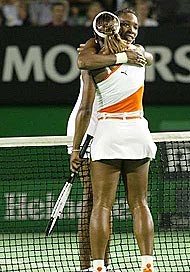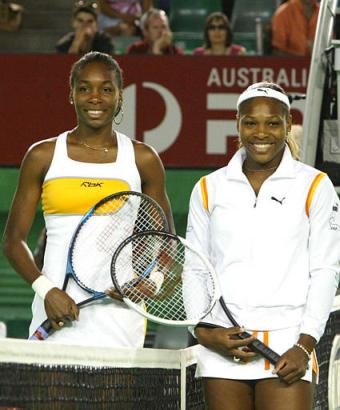



From The America's Intelligence Wire: The class of Venus Williams
Jan 19, 2003
Byline: Shana Gruskin
BEFORE THOSE who remember the days of the amateur, sport today is not what it used to be.
In days gone by, sport, even at the highest level, was fun. It was skill versus skill, and even though victory was important and was everyone's desire, there were, most times, smiles and hand-shakes at the end.
In those days, the smiles and hand-shakes preceded words of congratulations, words like "well played" from the vanquished and words like "tough luck" or "better luck next time" from the victors.
Today, most times that is not so - and particularly so in professional tennis where a number of its stars have been described as spoilt brats.
In these days of professional sport - including tennis - money is the heart's desire, because of that, winning is everything, because of that, skill, exciting skill, is sacrificed on the altar of consistency and because of that, winners have little sympathy for losers, and apart from finding all kinds of excuses, losers huff and puff while behaving as if their lives have been shattered.
In the midst of the dog-eat-dog attitude of recent times, however, there have been a few who, despite their pursuit of excellence, believe that winning is not everything, that losing is not the end of the world, that sport is still a test of one's skill, those who thrill the fans with exciting play and who are gracious in defeat and magnanimous in victory.
Numbered among those is tennis player Venus Williams - the world No. 2 and big sister to No. 1 Serena Williams.
In an age when champions behave as if they are invincible, as if they are God's gift to a sport, that it is their divine right to win, and that their opponents should not even think of winning much more play to win, Venus is a class act.
One of the responsibilities of professional sportsmen and sportswomen is to give of their best every day, to market their sport and therefore to represent it well, and Venus Williams, certainly in the past few years during which she has been a champion on many occasions, has been doing just that.
She is always happy and smiling, regardless of who is her opponent, she is always parading her skills, and although, obviously, she is happier when she has won, when a match is over she always has something nice to say - particularly about her opponent.
Her response to a question about her form after committing 28 unforced errors while defeating Ansley Cargill 6-3, 6-0 at the Australian Open a few days ago is a perfect example of her attitude and worth remembering.
"It's impossible to play your best every day. No matter who you are, your opponent can come out and play better tennis. I realize that any day could be my day to go home, so it's my intent to ensure that each day is not my day and each day will be the day that I'll come back as the winner. I haven't picked up my game but I am trying. That's all that counts."
Those were the words of a player, a champion at that, who respects the game, who respects her opponent, who does not believe that she is invincible or that she is God's gift to the sport, who, although she knows that she cannot be at her best every day, gives her best every day, and every one was accompanied by a smile.
Sport today is not what it used to be and because of the changing times no one should expect it to be what it was. It can still be exciting, however, it can still be enjoyed by all and Venus Williams has shown that it can be.



From NYTimes.com: Williams Sisters Complete a Role Reversal
By CHRISTOPHER CLAREY
January 26, 2003
MELBOURNE, Australia, Jan. 25 — The match was longer than usual but still business as usual, and after Venus Williams had taken her now customary subservient place next to her all-conquering younger sister Serena after today's Australian Open final, she was soon standing in front of a microphone on court.
"I'm trying to be just like her," Venus said of Serena.
For longtime Williams watchers, that was a remarkable statement, the latest and most definitive sign that the tennis roles have been thoroughly reversed. As youngsters, it was Serena taking notes on Venus, emulating her game and assimilating her world-beating aspirations. But Venus is the one in need of inspiration now, and the question is whether her fourth consecutive loss to Serena in a Grand Slam singles final — this time by the score of 7-6 (4), 3-6, 6-4 — will sting her pride and pique her appetite for success or resign her further to the fact that her more openly tenacious and vivacious sister has surpassed her as a champion.
Just seven months ago, Serena still had one major singles title to Venus's four, and her motivational tool at the French Open was to keep repeating those numbers to herself during tight matches. Now, Venus should be the one talking to herself.
All in a rush, Serena now has five major titles to Venus's four and has assured her place in the game's lore by becoming only the fifth woman to hold all four Grand Slam titles at once. Though it's technically not a Grand Slam because she did not win them all in the same calendar year, Serena said today that she still considers herself a Grand Slam winner.
"I think in order to win four in a row, either way, you have to be pretty serious," she said.
At the end of last year Venus started her own small business in Florida, an interior decoration firm called V Starr Interiors that has already received plenty of free publicity. But Venus insisted today that she is not yet ready to abandon tournament tennis for design.
"I'm really enthused," she said, ruling out seeking any coaching from anyone other than her parents. "It's my job. It's my main pursuit at this point, so I would like to continue with my next tournaments, and basically I'll just keep improving, go home and go practice."
Asked much later if she felt bad for Venus after beating her once again, Serena said: "Most definitely. I really wish that she could have come through today, but just as a player and as a champion, I just had to try to keep giving it my best."
Has there ever been a dynamic quite like this in sports, where a player on the verge of making history admits that she was rooting for her adversary? Where the crowd feels awkward for playing favorites? Where the world's No. 1 and No. 2 players trade blows for 2 hours 22 minutes, push each other deep into the final set, and the whole production still seems muted?
The Williamses know that they are unique and that they generate ambivalence, and that was part of the reason for Serena's tears during her abbreviated victory speech.
"I cry in movies, but outside of a movie you can't get me to cry, except for today," she said. "All of a sudden, a million things came in my head and I started thinking about all the work I put into it, not just today and just these two weeks and not even just a year. But all those years of going out on the court, even when I didn't really want to, and all those years of my dad helping me and my mom always being there."
Her mother was in Melbourne, but her parents are divorced now. Her mother, Oracene, now has the last name Price, not Williams, but her father, Richard, certainly seems to have got this much right: His daughters are No. 1 and No. 2 in the world and Serena is the better player.
"I think right now she's just probably a little mentally tougher out there," Venus said. "I think maybe that's the main thing that's dropped off in me. Usually I would just really get in there and take a match like that, normally. I'm going to work on it. I'm going to fight, and I'm going to concentrate."
Venus is going to go back to work on her game, and though the public might be losing interest in their rivalry because of her little sister's dominance, she still has Grand Slam plans of her own. For now, the roles remain reversed, and their mother maintains that even if they do not revert to prior form, there will be no driving a wedge between her daughters.
"It's still a sport, still a game for them," Oracene Price said. "You still have to be sisters and brothers. But that is something taught long before they got out here on the court and in front of the public. Because it probably would have been a problem if it hadn't been taught the right way: the value of family."





